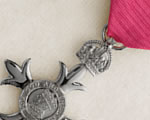 Go to main content
Go to main content
Archive Website of the UK government
Please note that this website has a UK government accesskeys system.
Main menu
Page menu
Government, citizens and rights

Honours committees

After nominations for honours have been made, a review process begins. As part of this process, specialist committees and a main honours committee assess the nominees, and make recommendations as to what the final decisions should be.
How the selection process works
The Main Honours Advisory Committee reviews the honours recommendations submitted by eight specialist sub-committees, and then agrees a final list to be submitted through the Prime Minister to the Queen for approval.
The Main Honours Advisory Committee is chaired by the Cabinet Secretary and its members are the chairs of the eight specialist sub-committees, the Permanent Secretary of the Foreign and Commonwealth Office, the Chief of Defence Staff and another Permanent Secretary.
Who can receive an honour?
The eight sub-committees are listed below, along with the subjects they oversee, and the areas of work and study for which honours may be granted. These lists are designed to give you an idea of the honours areas, but please note this is not a full and complete list.
Arts and media
These are some areas considered by the arts and media sub-committee for which honours may be issued:
- architecture
- creative arts, crafts and design
- performing arts
- literature
- music
- media
Health
Honours may be issued for work in the following health fields:
- medicine
- nursing
- allied health professions
- health organisations such as St John Ambulance and the British Red Cross
- medical administrators and support staff
Education
Those working in education could be nominated for their work in the following areas:
- the humanities
- academia
- learned societies
- education committees or authorities
- education and teaching unions
- higher and further education including adult learning
- schools
- early years education
- special education
Science and technology
Honours may be awarded for work in the following science and technology areas:
- research councils
- the Royal Society
- scientific exploration
- academic and research science
- environmental science and astronomy
- economics
- engineering
- mathematics
- social science
- technology
Economy
Honours may be awarded for work in the following fields of business and the economy:
- agriculture
- forestry and fishing
- banking, insurance and finance
- tourism and other related industries
- manufacturing, engineering and industry
- the food and hospitality industry
- retail
- utilities
- transport industries and related work
- communications, publishing and related industries
- defence and related industries
- housing, property and related industries
- representative bodies for industry, commerce and retail
- regulatory bodies for utilities
- trade unions
Community, voluntary and local services
Those in voluntary and local services can be honoured for work in areas including:
- law and order
- local government
- community service including charities
- volunteering
- support for community, national and local services
- public service not covered by central or local government
Sport
Those involved in sport can be honoured for their work. Those who could qualify include:
- competitors
- sports administrators
- those involved in grass roots sports
State
State workers may be honoured for their work, including those who work for or with:
- home civil service
- devolved administrations
- the Houses of Parliament
Philanthropy
The Philanthropy Committee is a sub-committee of the Main Honours Committee. It is chaired by the Chair of State Committee, Dame Mary Marsh DBE. Its membership comprises the Chairs of those specialist Honours Committees (usually Arts and Media, Economy and CVLS) which have considered philanthropists for honours. The Philanthropy Committee’s functions will be to review the levels of award proposed for philanthropists by the specialist Honours Committees; and to consider whether any additional philanthropists, who are making a difference to the Big Society through a sustained personal engagement, should be recommended for honours.
Committee appointments and recruitment
Committee appointments are usually made for a period of four years. Recruitment is regularly carried out to refresh committee membership, and vacancies are advertised on the Cabinet Office website. Committee membership lists are updated after each recruitment exercise has taken place.
 Facebook
Facebook Twitter
Twitter StumbleUpon
StumbleUpon Delicious
Delicious Reddit
Reddit
